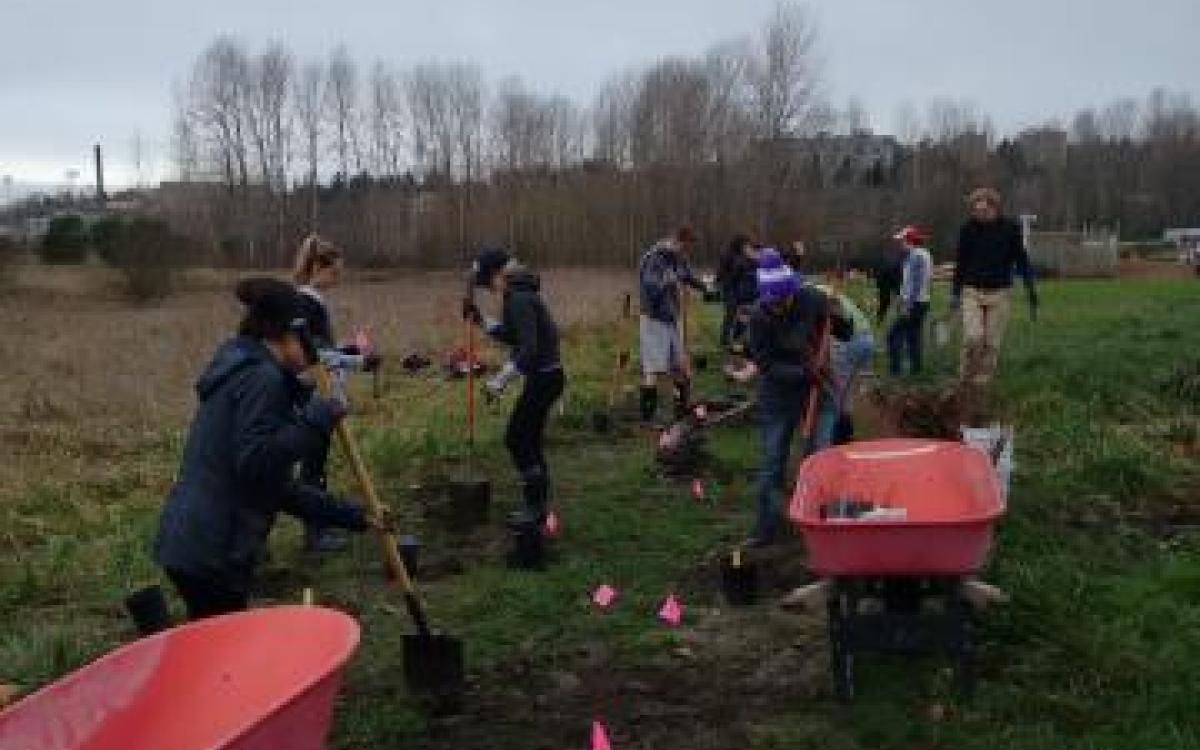At a glance
This project will establish pollinator habitats at the UW Farm at the Center for Urban Horticulture to support native insects… Read full summary
- Funding received
- 2015-2016
- Small
- Awarded
- $1,000
- Funding partners
-
- Services and Activities Fee (SAF)
This project will establish pollinator habitats at the UW Farm at the Center for Urban Horticulture to support native insects and improve crop yield. It includes a wildflower buffer zone, a perennial shrub habitat for overwintering insects, and a rock garden and insectary for nesting. The project enhances biodiversity, supports student food production, and provides learning opportunities for UW students and youth from Seattle Youth Garden Works. With faculty support and funding, the habitats will be low-maintenance and serve as a lasting educational and ecological resource.
I am writing to state my intent to apply for a Campus Sustainability Fund grant in the Autumn of 2015 for the project: Planting and Installing Pollinator Habitats at the University of Washington Farm at the Center for Urban Horticulture. This project will contain several components. First, a 100 foot wildflower buffer zone, containing a variety of annual (and some perennial) species, will be mowed/tilled & resowed each year to provide additional nectar sources and habitat for native pollinators (in future years, this will fall under responsibility of the farm manager & interns). As well, I will design and plant a pollinator habitat composed of woody perennial plant species that will provide shelter, and most importantly, overwintering habitat for insects. Finally, I will design and build a rock garden and an insectary, constructed out of assorted lumber & other materials, to provide nesting sites for particular pollinators that require bare ground & woody material.
By installing suitable habitat for local pollinating insects, this project will both enhance the biodiversity of the surrounding Union Bay Natural Area and benefit student food production at the UW Farm by potentially increasing the yield of vegetables grown and the genetic diversity (stress-tolerance) of the crops. Habitats will also provide a home for other, non-pollinating species that will benefit the farm such as parasitic wasps or flies that kill pest insects.
UW students that work and volunteer at the farm will have the opportunity to help plant the vegetation over the coming year. They will learn how to care for the habitats into future years: replanting of annual flowering plants, trimming and maintenance of perennial shrubs, and removing weeds that grow into the area. Teens and young adults from Seattle Youth Garden Works will also be involved in the installation and future maintenance of the pollinator habitats. Any future work on the site will require minimal effort by volunteers; after the initial installation is completed the woody plants will be self-sustaining, and the wildflower buffer will only require one sowing from a pre-determined seed mix.
As a student in the Masters of Environmental Horticulture program, I will have support and guidance from professors in the program, particularly my advisor, Kern Ewing. This project is a collaboration with Sarah Geurkink, UW Farm manager, and Anthony Reyes, Seattle Youth Garden Works manager. I have knowledge of appropriate, native vegetation that will require the least amount of additional maintenance and ample resources (advisors, coursework, literature, and other local experts) to aid in implementing the project.
The estimated budget for this project is $1000. This will cover the cost of materials: woody perennial plants from the Society for Ecological Restoration (SER)-UW Nursery, seeds from local suppliers, and scrap lumber and other materials to build the insectary & rock garden.
Breakdown of Budget Estimate:
$200 - Woody perennials (approx 50) at $3.50 - $4.50 per pot from SER's CUH Nursery
$200 - Lumber & rocks for bare ground nesting landscape (rocks from Marenakos' in Issaquah)
$600 - Seeds from local nurseries for 100ft x 8ft wildflower buffer just south of farm
Timeline Estimate:
Fall 2015 (late November and December) - Plant woody perennials in adjacent habitat area
Winter 2016 (January and February) - Construct rock garden & wooden bee structure
Spring 2016 (March) - Sow seeds for wildflower buffer
Thank you for your time!
Nicolette Neumann
Project lead
- nneumann@uw.edu
- Affiliation
- Student
Sarah Geurkink
Team member
- sgeurk@uw.edu
- Affiliation
- Staff
